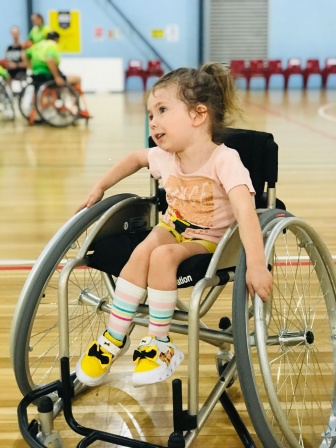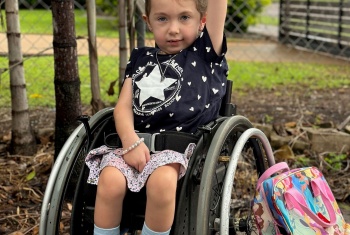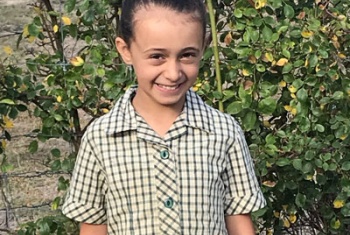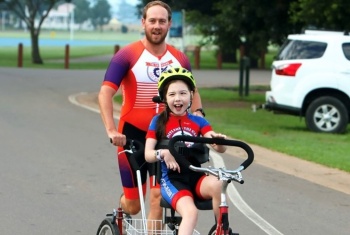Darwin pre-schooler Aviana (Avi) McElwee wasn’t expected to live to celebrate her first birthday.
But the little girl who lives with a life-threatening disability has defied all the odds and is now attending day care, doing ballet classes and playing wheelchair basketball.
Avi’s mum Bethan says she’s doing better than ever—all thanks to Avi’s determination and early intervention therapies through the NDIS.
“To see Avi now, I can’t even believe it, it’s just mind blowing, it feels like a dream,” she said.
“We never imagined that she would be where she is. She has come ahead in leaps and bounds because of all the therapies and equipment she has through the NDIS.
“She’s so proud because she’s able to do more by herself. She goes to day care and ballet classes and plays wheelchair basketball too, and she’s making her own little friends.”
Bethan says Avi is becoming stronger, happier and more independent every day. She says a new NDIS-funded manual wheelchair is a better fit for Avi, helping her to become more autonomous.
“The chair allows her to pull herself up to her drawers in her room, so she can choose her own clothes in the morning and she is starting to dress herself. She can do the same in the kitchen and she can make herself a little breakfast in the morning.
Bethan says a new custom bed, provided through Avi’s NDIS plan, has also played a key role in Avi’s growing independence.
“She feels more in control of her life,” she said. “She can use the bed to sit herself up or lower herself down. She can give herself a drink of water during the night or get herself a tissue.
“It’s huge for her because she doesn’t have to lie there waiting for someone to help her, she can do it herself and it makes her so happy, and that makes us so happy too.”
Avi lives with a rare genetic neuromuscular disorder—spinal muscular atrophy, type 1 (SMA1), which is the leading genetic cause of death in infants. SMA1 destroys motor neurons, the kind of nerve cells Avi needs to move, eat and breathe.
Like motor neurone disease in adults, SMA doesn’t affect Avi’s brain or intellectual capacity. But at five months old, she didn’t have the strength to turn the page of a book or hold a teddy bear and her motor neurons were dying.
Doctors told Avi’s parents she would die before her first birthday.
“Nobody can prepare you for that. Our whole life just fell apart,” said Bethan.
But with a new drug on the market, followed by intensive early intervention therapies and assistive equipment through the NDIS, Avi has proved doctors wrong.
Avi receives physio, occupational, hydro, speech and other therapies, all funded through an Early Childhood Early Intervention (ECEI) NDIS plan, which supports children with disabilities under the age of seven.
“Avi is such a happy, contented little girl now,” said Bethan. ”She is a ray of sunshine who has such a positive impact on everyone around her. She is the most determined person I know, the most resilient person in the world.”
“But without the NDIS and that early intervention, she wouldn’t be where she is. I feel really thankful that we’re so well looked after here in Australia and we get a so much help and support.”



